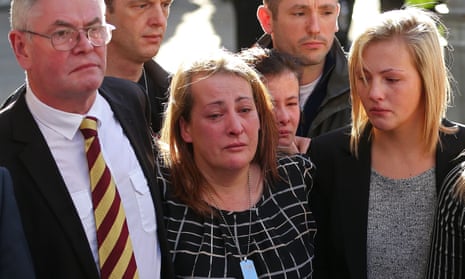The mother of murdered soldier Lee Rigby has said she was threatened with arrest unless she attended the appeal hearing of a man who harassed her over her son’s death.
Lyn Rigby was told she would be prosecuted unless she attended the appeal of Christopher Spivey who said her son’s death was a hoax.
She said her treatment by the authorities was “absurd and shocking” after she was summoned to a court hearing where she had to relive graphic details of her son’s murder.
Rigby said she was left “trembling from head to foot” when a photo of Michael Adebolajo, one of her son’s murderers who was covered in his blood and brandishing a meat cleaver, was shown to the court.
“This has been one of the worst weeks since Lee died and it brought all the terrible emotions flooding back to me as if my son had been murdered all over again,” she told the Sunday People. “I believe in our justice system because it put Lee’s killers behind bars but I don’t believe we should have been forced to court for this man.
“And to threaten us with prosecution if we didn’t attend was just absurd and shocking as well as deeply upsetting. It suggests that my grieving family has somehow done something wrong.”
Spivey, from Rochford, Essex, was convicted of harassing the Rigby family and sending grossly offensive messages over social media in 2015. He posted a series of comments on social media about the May 2013 killing in Woolwich, south-east London, including claims that the soldier had never existed and that the story of his murder was a conspiracy. The harassment began the day after the killing.
Spivey published the family’s home addresses and private photographs online and contacted the soldier’s sister, Sarah McClure, claiming her husband, Rob, also a soldier, and Fusilier Rigby were the same person.
Spivey was found guilty and received a suspended sentence. After maintaining his innocence, he launched an appeal that was reportedly dismissed after a four-day hearing at Chelmsford crown court last week.
Rigby questioned why she and her daughter were made to attend the hearing via videolink from Bury magistrates court after they submitted witness statements. She said: “It’s horrific enough losing my son in such a violent way but to listen to this man’s twisted drivel was just heaping more misery on me.
“I didn’t want to go to court and when I told the police this they replied that me and my daughter Sara would be arrested and prosecuted if we failed to turn up. How was this allowed to happen? We’d already delivered written witness statements the first time round but on his appeal they demanded we appear in court to be questioned over and over.”
During the hearing, Rigby was visibly upset and proceedings had to be paused on occasions. “I was terrified and felt sick to the stomach. The judge had to halt the hearing several times because it was so aggressive and upsetting for me.”
Dave Hines, founder of the National Victims’ Association, criticised her treatment and ministers for failing those affected by crime. “I feel for Mrs Rigby and the horrendous ordeal she has had to go through. It’s beyond comprehension, it’s completely outrageous and the public will be shocked. Families like this are let down by the system,” he said.
Abenaa Owusu-Bempah, a lecturer in law at City, University of London, explained why Rigby had to attend. “As a matter of law, if a witness refuses to give evidence at a trial, they can be compelled to do so. Compelling a witness to give evidence is not a decision that is made lightly. However, it can be necessary to ensure a fair hearing. As this was an appeal from the magistrates’ court, the entire case was heard again in the crown court.
“In difficult cases such as this, measures can be put in place to ease the burden of giving evidence, including via video link. It is important to seek ways to minimise the negative emotional effects of giving evidence. However, at the same time, it is necessary to take account of what is at stake for the appellant and the need to ensure that the original verdict was correct.”
